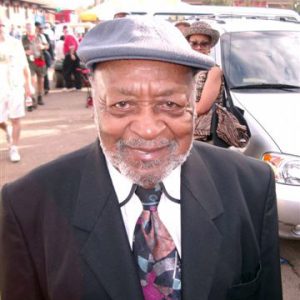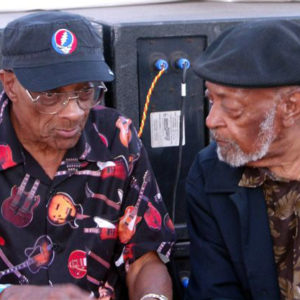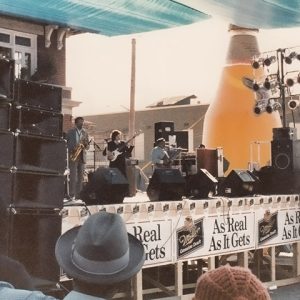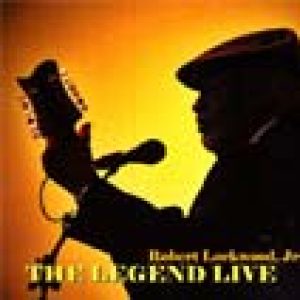calsfoundation@cals.org
Robert Lockwood Jr. (1915–2006)
Robert Lockwood Jr. was a blues guitarist celebrated for his progressive, jazz-like style, his longevity, and his role in many major events in the development of the blues. He was the only person who learned guitar directly from the legendary Robert Johnson, who often lived with Lockwood’s mother during Lockwood’s formative years. These factors have made a paradox of Lockwood’s career. Although one of the most distinguished musicians of his time, Lockwood never prospered commensurately with his reputation. He was best known as an accompanist to more flamboyant stars, especially Sonny Boy Williamson and Little Walter Jacobs.
Robert Lockwood Jr. was born on March 27, 1915, in Turkey Scratch, on the line between Phillips and Lee counties, twenty-five miles west of Helena (Phillips County). He was the son of Robert Lockwood and Esther Reese, of whom little or nothing is known. One source says that Lockwood moved briefly from Helena to St. Louis, Missouri, at age seven. He dropped out of school in the late 1920s.
Lockwood first made music on his family’s pump organ. He was in his late teens when he learned guitar from Johnson. Soon after, he acquired the nickname Robert Jr. because of his admiration for and emulation of Johnson.
At about age seventeen, Lockwood started playing professionally. He performed with Johnson, with Johnson’s partner Johnny Shines, and with the freewheeling Williamson. He toured with them and performed all over the Delta, often playing on street corners for change. For decades, Lockwood performed professionally as Robert Jr. Lockwood until he wearied of the attention he received because of the name, as it connoted his being Johnson’s stepson, a fact that he thought overshadowed his own achievements.
Johnson died in 1938, and Lockwood was more or less on his own. He made his first recordings in Aurora, Illinois, in 1941, performing as a guitarist on Doc Clayton’s sessions for the RCA Bluebird label. That year, he teamed with Williamson once more, and they started hosting a noonday radio program, sponsored by the Interstate Grocery Company on Helena’s KFFA. King Biscuit Time was the first regularly scheduled live broadcast of country blues. The show’s band, in addition to star Williamson and his sideman Lockwood, consisted of rhythm makers James “Peck” Curtis and Dudlow Taylor.
Lockwood moved to Chicago, Illinois, in 1950 and performed with the historic group that provided backup for Chess Records stars Muddy Waters and, in particular, Little Walter. Lockwood became a member of the band, the Aces, and played an important role in the development of the Chicago Shuffle, a blues innovation played on electrically amplified instruments that served as a prototype for classic rock and roll. In that period, he toured with Eddie Boyd and others.
In 1961, Lockwood moved to Cleveland, Ohio, where some reports indicate he was stranded in the midst of a shabby tour by Williamson. He eventually began to record under his own name. The recordings included “Steady Rolling Man” on the Delmark label and “Does Twelve” on Trix. Some earlier recordings for the Decca, Mercury, and Candid labels are difficult to find. Some of his earliest recordings, many in a style derived from Johnson, are collected on Yazoo’s albums Lonesome Road Blues and Windy City Blues.
Lockwood sustained a career that went neither unheralded nor unrewarded, albeit underrated and under-compensated. He was inducted into the Blues Hall of Fame in 1989, received the National Heritage Fellowship Award (presented by Hillary Clinton) in 1995, and was inducted into the Delta Blues Hall of Fame in Cleveland, Mississippi, in 1998. In 2002, he received an honorary doctorate of music degree from Ohio’s Cleveland State University. He had a street named for him in Cleveland—Robert Lockwood Jr. Way.
Lockwood continued to tour nationally and record one album a year until his death on November 21, 2006.
For additional information:
Buckalew, Terry. “‘Steady Rolling Man’: Arkansas Bluesman Robert ‘Junior’ Lockwood.” Arkansas Historical Quarterly 53 (Spring 1994): 75–89.
Cobb, James C. The Most Southern Place on Earth: The Mississippi Delta and the Roots of Regional Identity. New York City: Oxford University Press, 1994.
Guralnick, Peter. Feel Like Going Home: Portraits in Blues and Rock ’n’ Roll. Boston: Back Bay Books, 1999.
Hoffman, Larry. “Robert Lockwood, Jr.” Living Blues 121 (May–June 1995): 13–29.
Inada, Mitsutoshi. “Robert Lockwood, Jr. (1915–2006): A Bridge between the Delta and Japan.” Arkansas Review: A Journal of Delta Studies 43 (December 2012): 147–163.
Lee, Peter. “Robert Lockwood, Jr.: Unlocking Some Secrets.” Living Blues 90 (March–April 1990): 32–35.
Palmer, Robert. Deep Blues. New York: Penguin Group, 1982.
Jim Kelton
University of Arkansas, Fayetteville
 Robert Lockwood Jr.
Robert Lockwood Jr.  Robert Lockwood Jr.
Robert Lockwood Jr.  Robert Lockwood Jr.
Robert Lockwood Jr.  "Sweet Home Chicago," Performed by Robert Lockwood Jr.
"Sweet Home Chicago," Performed by Robert Lockwood Jr. 




Comments
No comments on this entry yet.